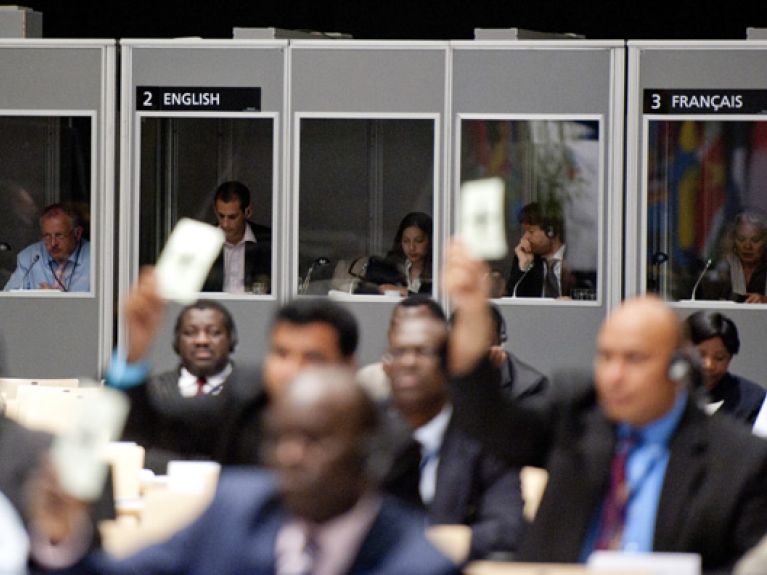The voice of Europe
The EU is a far cry from being a Babel of tongues. Thousands of translators help create understanding.

Have you ever ordered “Beiried mit Erdäpfeln” at a restaurant? Very few people in Germany will actually know what these German words mean. Most, however, will have eaten this dish at one time or another, because it is nothing more than roast beef with potatoes. The words “Beiried” and “Erdäpfel” are mainly used in Austria. Alongside 21 other regional German expressions, they have successfully made it into European Union (EU) legislation. Since 1995, the year in which Austria acceded to the EU, these 23 words have had legal status, which means they have equal standing in official texts. For Austrians this was an important symbolic act. After their accession to the EU they neither had to say farewell to their culinary expressions, nor their cultural identity.
The EU is naturally also a community of different cultures and languages. No other organisation in the world is as strongly multilingual. In fact, multilingualism is firmly anchored in European treaties. Every EU citizen has the right to communicate in one the official languages of the Union and to receive an answer in the same language. At present, the official languages of the EU are the 24 official languages of its member states. Multilingualism and cultural diversity are brought to life by the thousands of translators and interpreters who work at the European Union. “It is difficult to give an exact total, because each EU institution has its own translation service and also works with free-lance staff,” says Gurli Hauschildt. The Dane is one of six Directors at the Translation Service of the European Commission and heads the departments of the three EU working languages English, French and German. “These three languages enjoy a special status – they are used by the Commission to conduct internal business,” she explains.
Gurli Hauschildt knows very precisely how many permanent staff work in her Directorate-General: a total of 2,400, most of them translators. Great importance is attached to understanding in the European Union: no other service within the Commission has more personnel. Nothing that happens in the European Commission passes Gurli Hauschildt and her colleagues by – eventually everything lands on the translators’ desks. After all, every single change in EU law has to be translated into all official languages. The speeches of the Commission President, press releases, letters from EU citizens and the respective answer from the Commission, texts for its website and much, much more all have to be translated, although not always into all languages.
Margret Meyer-Lohse is someone who has literally written EU history in the course of her working life. Thirty-six years ago she began her career as a translator and interpreter at the European Commission and experienced first-hand how a European Economic Community (EEC) of six countries grew into today’s European Union with 28 member states. She is now mainly occupied with organisation: Margret Meyer-Lohse heads the German language department of the Commission’s translation service with roughly 120 staff. In 2004 she discovered the enormous effort involved in EU enlargement. That was the year in which Lithuania joined the Union, and Margret Meyer-Lohse helped to set up the new Lithuanian language section. “Of course, complexity and workload increase with each new official language,” she says. Hardly any new personnel are hired. If necessary, staff learn new languages. That keeps down the costs: in fact, the budget of the Directorate-General for Translation amounts to only roughly 1% of the entire EU budget. However, the head of the German language department feels some values cannot be expressed in monetary terms: “Each new EU member state gives us a renewed boost of energy. We then come into contact with young people and fresh ideas, which has an incredibly motivating effect.”
Whether they are Lithuanian, Maltese or Croatian, people here usually communicate in English in their everyday work. Nevertheless, the German language enjoys a special status within the EU – and not only because it is a working and founding language. With just under 90 million native speakers it is also the EU’s most widely spoken mother tongue. What Andreas Husch, one of Meyer-Lohse’s team of translators, appreciates most about his native language is its clarity and the enormous richness of its vocabulary: “Translators of other languages often look at our translations if there is something in the original text they don’t understand. That’s because it is almost impossible for us to express ourselves ambiguously.” German, he adds, is a very structured language. Almost no other grammar offers such a large number of syntactical possibilities. There is one disadvantage: “Compared to other languages we are practically unable to make use of machine translation. Our grammar still presents problems for the software,” says Husch.
Computers and terminology databases are also not very helpful when it comes to words that can be easily confused – for example, legal terms that have a very specific meaning in one member state and therefore cannot be used in EU legal texts so easily. This calls for a certain amount of creativity, since the translators sometimes have to come up with completely new terms. Occasionally their neologisms even influence debates. “Flexicurity” is an example of this, says Husch. However, the EU is still a long way from having its own language. Director Gurli Hauschildt prefers to speak it of having a common message and shared values, such as democracy and tolerance: “They give Europe its own voice in the world.” ▪

